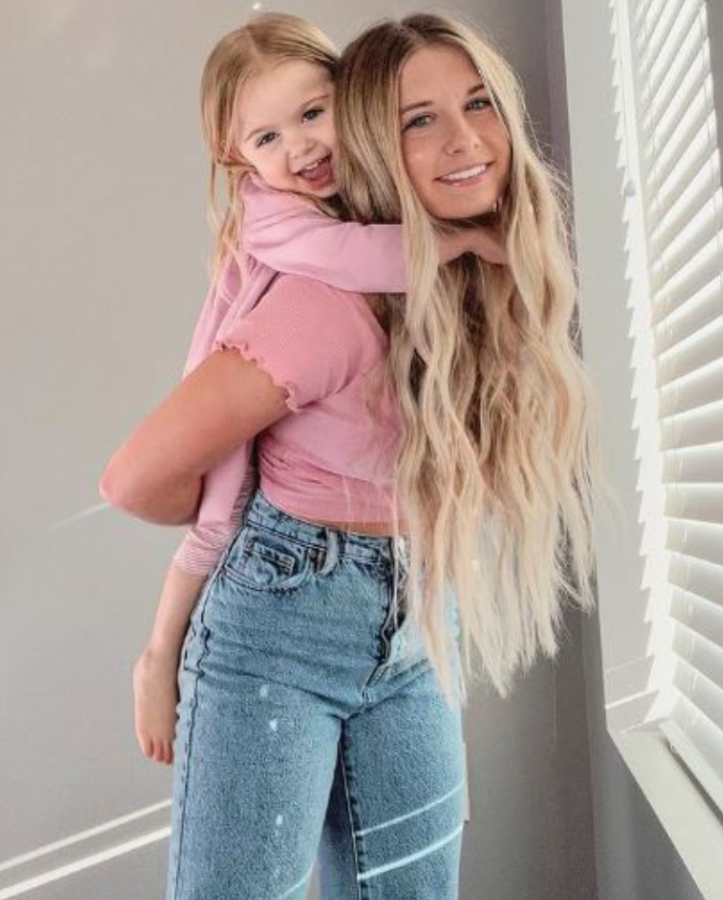Children need to be protected on public platforms
It is important that parents take steps to protect their children in order to prevent sexualization and exploitation.
Courtesy of @Tiktokwren on Instagram
The sexualization of three-year-old Wren on Tik Tok shows the need for stricter protection, writes Breanna Laws.
September 8, 2022
Though harmless in its intentions, posting children on highly popularized platforms may cause more harm than good.
Recently, a controversy over the TikTok account @wren.eleanor has many parents reconsidering how they present their children on social media. This account is run by Wren’s mom, Jacquelyn, and they primarily post dress-up and day- in-the-life videos.
Wren, three, now has 17.4 million followers on this platform – this publicity has led to major public controversy. Many commenters have expressed their concerns for Wren’s safety, due to information regarding her presence on child pornography websites.
The following is a compilation of comments that were left on various videos on Wren’s account. These comments, though not containing profanity, may be disturbing to some audiences, as they heavily imply the sexualization of this young girl:
“It is tender to see how the girl dances”
“Daddy’s love girl”
“Your daughter is so cute. I like the baths videos”
“Perfect body”
“I love these pictures. I want to take them and put them in my room”
“She is so mature for her age”
“Lovely feet”
“Her eyes are compelling”
In addition to these disturbing comments, some of Wren’s TikTok videos have been speculated to be posted on child pornography websites. Many older men have been seen reacting to Wren’s videos — particularly videos of her doing “taste tests” with her mom. Commenters request different foods for her to try, which have included hot dogs, cucumbers and pickles.
Some of the top searches for Wren on TikTok have been “Wren Eleanor Tampon,” “Wren Eleanor Eating Corndog” and “Wren Eleanor Swimsuit”. For these results to be at the top, multiple users must have searched for the same terms.
The final aspect causing audience concern is the sheer number of people who have saved and shared videos of this young girl. On a video of her taking a bath, there are over 60,000 saves and 19,000 shares. This is in comparison to only 14,000 comments on the video. Additionally, videos of Wren in the bath or wearing older kids’ clothing have noticeably more saves than her other videos.
In light of this controversy, many TikTok “influencers” and other parents have begun blurring out their children’s faces.
Some have even deleted previous posts of their children and stopped posting them in general. These parents deem this a necessary step in protecting their child’s privacy, but many believe that this is an overreaction.
Being from a small town, I can confidently say that almost every parent posts their children on social media platforms. I was always posted to my parents’ Facebook account, and still am to this day. However, my parents do not have over 17 million people viewing pictures of their children.
This is where I believe the fine line between pride in your children and exploitation becomes relevant. Private social media accounts in which you control who views your images are what are most often used by the average family. It is much easier to manage your child’s online presence in a way that is healthy and unlikely to cause any unforeseen harm.
In a statement released by Wren’s mother, Jacquelyn, she claims that there is no way to control “creeps” online and that these types of people are everywhere in society. The latter half of this statement holds a lot of truth, which is exactly why taking extreme measures to protect our children online is crucial.
Concerning Jacquelyn’s claim that there is no way to control these types of people online, she is completely incorrect. There is a way to prevent adults who engage in sexual misconduct with minors from sexualizing your child’s content: stop giving these individuals content to sexualize.
Expressing pride in your children can easily be done through private platforms in which you control who follows you. To claim that you need an overtly public platform to do this is a meager excuse for you to continue to profit at your child’s expense.
While Wren’s case is currently in the spotlight, there are many children facing exploitation and sexualization. The Every Child Protected Against Trafficking Coalition is an international effort to educate people on the dangers of child exploitation, as well as advocate for affected children. To explore their resources, you can visit www.ecpatusa.org/.






















